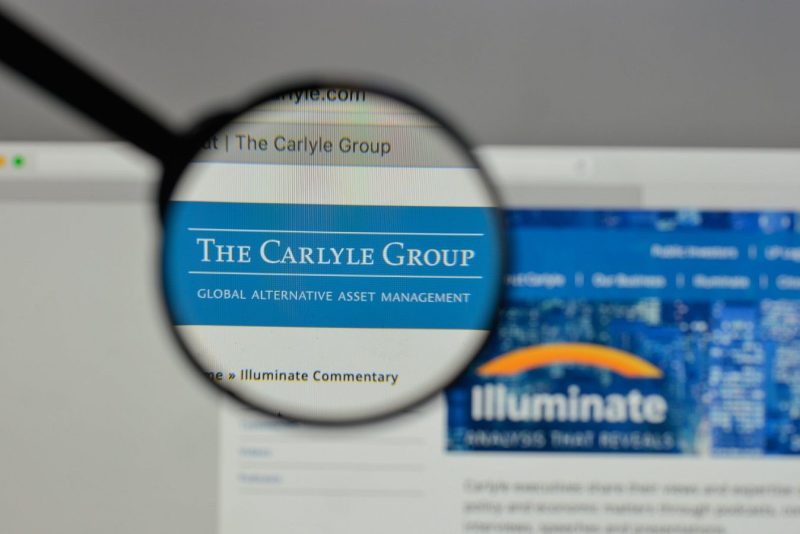Private equity companies have done well in the past 12 months, helped by the robust inflows into alternative assets. The closely-watched Invesco Global Listed Private Equity ETF (PSP) has jumped by over 30% in this period and is hovering at its highest point since 2022.
David Rubenstein’s Carlyle has trailed peers
Carlyle Group (CG) stock has trailed other popular PE companies in the last few years. It has barely moved in the last three years while companies like Apollo Global Management and KKR have more than doubled.
This underperformance has continued this year, as shown below. In this period, Carlyle’s stock has risen by 9.16% while TPG and KKR have risen by 40% and 60%, respectively. Other companies like Apollo, Blackstone, and Brookfield Asset Management have all jumped by over 205.
Carlyle Group’s underperformance is mostly because of the management issues it went through in 2022 when Kewsong Lee abruptly resigned before the end of his five-year contract. His resignation was mostly because of his pay and the substantial disagreements about how to run the company since David Rubenstein and William Conway were still around.
Carlyle Group then appointed Harvey Schwartz, a former president and Chief Operating Officer at Goldman Sachs.
Schwarz’s tenure has benefited from the general outperformance of the private equity industry and the increased inflows by institutions. It has also benefited from high interest rates, which have boosted its net interest income from $82.6 million in 2019 to over $239 million last year.
Carlyle Group’s annual revenue retreated to $2.42 billion last year from $4.1 billion a year earlier.
Carlyle Group earnings
The most recent financial results showed that Carlyle Group’s total assets under management (AUM) rose to over $435 billion, a 13% increase from the same period last year. Its fee earning assets jumped to $307 billion while its perpetual capital was $90 billion.
Carlyle Group raised $12.4 billion in the last quarter and $40.9 billion in the last twelve months (LTM).
Its quarterly revenue came in at $1.06 billion, higher than the $462 million in the same period last year. This revenue soared was mostly because of an increase in management fees and investment income.
Carlyle Group did several important transactions this year. The most important one was the acquisition of a landmark deal to acquire Discover Financial Services in a $10 billion deal. It has also remained highly active in the Collateralized Loan Obligations (CLO) industry, where it deployed $9 billion after raising $12 billion in the last twelve months.
Carlyle has also become a major player in the private credit industry. It raised $5 billion last quarter and is aiming to approach its credit target of $40 billion.
Analysts expect that Carlyle Group’s business will continue doing well as demand for private credit continued growing.
Interest rates and US election
A likely catalyst for the Carlyle Group stock is the recent interest rate cuts by the Federal Reserve and the upcoming US election.
The Fed decided to slash interest rates by 0.50% last week and hinted that more of these cuts will continue this year.
At the same time, the US will go to an election in November, and there are chances that Trump will win. Analysts believe that a Trump victory will be a positive thing for private equity companies for two main reasons. First, Trump will not introduce a bill to end the carry trade loophole.
Second, he will likely appoint a Federal Trade Commission (FTC) chair who will be willing to approve M&A deals. Therefore, companies like Carlyle Group and Blackstone will likely increase their realizations.
Carlyle Group stock is cheaper
There are a few reasons why Carlyle seems like a good investment for now. First, it has a higher dividend yield, which stands at 3.25%, higher than other firms like KKR, Apollo, and Blackstone. Of course, this yield is higher because the stock has underperformed the peers.
Carlyle has a forward one-year price-to-earnings ratio of 11.5, which is much lower than other companies. Brookfield has a multiple of 33 while TPG, Blackstone, Apollo, and KKR have multiples of 29, 34.5, 17, and 28, respectively. Its forward 3-year P/E multiple is 9, much lower than the other companies.
Additionally, while Carlyle is behind most of these firms in private credit, it is working on that, with its goal of reaching its $40 billion target. Consider what the CEO said in the last earnings call:
“Management fees in Global Credit and Solutions experienced double-digit growth year-over-year and hit record levels. We expect total management fees to accelerate across the second half of the year, driven by the nearly $20 billion of pending fee-earning AUM, the highest level since 2021.”
In my last article on Carlyle Group in January, I noted that the firm was a good acquisition target as companies race to the $1 trillion mark. For example, by acquiring Carlyle, Apollo, with its $695 billion in assets, would become a $1.1 trillion PE firm, making it bigger than Blackstone.
The post Carlyle Group stock is a bargain with potential catalysts appeared first on Invezz


